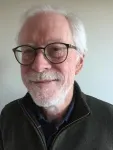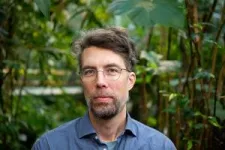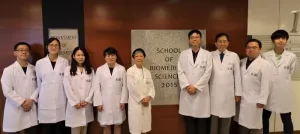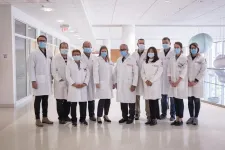(Press-News.org) Humans have a positive view of nature. But is this due to an approach we have learned while growing up, or is it something we are born with? The answer is ‘Both’, according to researchers at the University of Gothenburg and the Swedish University of Agricultural Sciences.
Our love of nature is highly individual and should influence how we plan our cities, say the researchers.
It is well known that nature has a positive effect on people. In cities in particular, studies have shown that trees and other greenery contribute to people’s wellbeing. However, experts do not agree on the reasons behind this phenomenon, known as biophilia.
Some believe that it is natural for humans to feel an automatic positive attachment because human development has occurred in nature. Others argue that there is no evidence for this, and that influences during our childhood determine how we view nature.
A wide range of factors involved
Researchers from the University of Gothenburg and the Swedish University of Agricultural Sciences (SLU) have reviewed several studies within this field that examine both innate factors and what individuals experience during their lives, primarily as children. In a new scientific article, the researchers conclude that both heredity and environment influence an individual’s attitude to nature, but that a wide range of factors also influence how love of nature is expressed.
“We have been able to establish that many people have an unconscious positive experience of nature,” says Bengt Gunnarsson, Professor Emeritus of Environmental Science at the University of Gothenburg. “But the biophilia hypothesis should be modified to link the variation in individuals’ relationships with nature to an interaction between heredity and environmental influence.”
Nature mean different things
This is because people react differently to nature. In a Japanese study, subjects were asked to walk in a forest and in a city while their heartbeat was measured. This showed that positive emotions while walking in a forest increased in 65% of people. Thus, far from everyone had a positive perception of nature. Another environmental psychology study found that research subjects are unconsciously drawn to nature instead of cities, and that this attraction was reinforced in those whose childhood was rich in nature.
“An additional study on identical and non-identical twins showed that a genetic component influences an individual’s positive or negative relationship with nature,” continues Bengt. “But the study also highlighted the importance of environment in terms of attitudes towards nature.”
Moreover, nature can mean completely different things to different people. Some enjoy parks with lawns and planted trees, while others prefer being in the wilderness. The researchers believe that this variation is also determined by both heredity and environment.
“So it’s important that we don’t standardise nature when planning greenery in our towns and cities,” adds Marcus Hedblom, a researcher at SLU and co-author of the article. “We shouldn’t replace wild greenery with a park and assume that it will be good for everyone.”
Urban nature brings many benefits
In today’s urban planning, densification has been a common way to achieve a more sustainable city. This can sometimes come into conflict with efforts to offer nature in cities. A large number of studies suggest that urban parks and green spaces contribute to increased physical activity and recovery from stress. The greenery in our cities is also important in other respects. Trees can clean the air and provide shade to create a tolerable urban climate on hot days.
“There are probably quite a large number of people who do not have such positive feelings towards nature, partly due to hereditary factors,” concludes Bengt. “Future studies that dig deeper into the interactions between hereditary and environmental factors are essential if we are to understand what shapes individuals’ relationships with nature. But we have to remember that we are all different, and take that into account when planning for different natural areas in towns and cities. Let people find their own favourite green spaces!”
Scientific article in Trends in Ecology and Evolution: “Biophilia revisited: Nature vs. Nurture”
END
Heredity and environment account for people’s love of nature
2023-08-17
ELSE PRESS RELEASES FROM THIS DATE:
Are you breaking your body clock?
2023-08-17
Researchers are using mathematical models to better understand the effects of disruptions like daylight savings time, working night shifts, jet lag or even late-night phone scrolling on the body’s circadian rhythms.
The University of Waterloo and the University of Oxford researchers have developed a new model to help scientists better understand the resilience of the brain’s master clock: the cluster of neurons in the brain that coordinates the body’s other internal rhythms. They also hope to suggest ...
HKUMed & CityU researchers jointly generate human neural stem cells with powerful therapeutic potential for the treatment of spinal cord injury, paving the way for new therapeutic opportunities
2023-08-17
A joint research team from LKS Faculty of Medicine, the University of Hong Kong (HKUMed) and City University of Hong Kong (CityU) has generated human neural stem cells with powerful therapeutic potential for the treatment of spinal cord injury that paves the way for new therapeutic opportunities. The new findings are now published in the leading multidisciplinary science journal, Advanced Science [link to publication].
Background
Traumatic spinal cord injury (SCI) commonly caused by a car accident, fall, or sport-related accident results in the progressive loss of neurons involved in motor and sensory functions at and around ...
Nauseous territory: outfoxing predators using baits that make them barf
2023-08-17
Introduced foxes, dogs, cats, rats, and other predators kill millions of native animals every year, but what if they were conditioned to associate this prey with food that made them ill?
A team of international researchers have shown the potential to do just that, burying baits containing capsules of levamisole, a chemical that induces nausea and vomiting when consumed by predators.
In a world first experiment conducted in south-eastern Australia, where introduced red foxes are responsible for countless wildlife deaths, the Australian National University (ANU) and University of South Australia scientists laid baits of fried deboned chicken, with some containing ...
Accelerating discovery in artificial intelligence for science
2023-08-17
What if artificial intelligence (AI) could be used to spur discovery in areas such as biotechnology, drug discovery and fluid dynamics? Using geometric graphs and innovative methodologies, AI can solve fundamental problems in basic natural science. The possibilities are endless in this relatively new field known as AI for science.
Dr. Shuiwang Ji, a professor in the Department of Computer Science and Engineering at Texas A&M University, recently received a National Science Foundation grant to ...
Sylvester Surgeon-scientist awarded center’s first Department of Defense grant to study pancreatic cancer
2023-08-17
MIAMI, FLORIDA (Aug. 17, 2023) – Researchers with Sylvester Comprehensive Cancer Center at the University of Miami Miller School of Medicine have been awarded a grant from the U.S. Department of Defense (DoD)’s Congressionally Directed Medical Research Program to target chemotherapy resistance in pancreatic cancer.
The $800,000, three-year grant is the first DoD award to Sylvester to study pancreatic cancer, a disease characterized by extreme resistance to chemotherapy and other treatments and dismal survival rates.
Pancreatic ductal adenocarcinoma is the most common and aggressive ...
Novel treatment based on gene editing safely and effectively removes HIV-like virus from genomes of non-human primates
2023-08-17
(Philadelphia, PA) – A single injection of a novel CRISPR gene-editing treatment safely and efficiently removes SIV – a virus related to the AIDS-causing agent HIV – from the genomes of non-human primates, scientists at the Lewis Katz School of Medicine at Temple University now report. The groundbreaking work complements previous experiments as the basis for the first-ever clinical trial of an HIV gene-editing technology in human patients, which was authorized by the Food and Drug Administration (FDA) in 2022.
The preclinical study, published online ...
Urban great tits have paler plumage than their forest-living relatives
2023-08-17
As urban areas expand, animals increasingly find themselves living in towns and cities. While some animals may benefit from milder temperatures and fewer natural predators in urban settings, they also have to cope with pollutants and changes in their diet. Previous research has shown that animals in cities are “duller” in terms of yellow-orange-red colour tones compared to their non-urban counterparts. However, previous studies have only focused on single geographic locations.
“We used feather samples collected from great tits in cities and forests across Europe. Different methods all confirmed that urban great tits ...
Our plastic waste can be used as raw material for detergents, thanks to an improved catalytic method
2023-08-17
(Santa Barbara, Calif.) — We’ve managed to accumulate so much plastic trash that it’s daunting to think about what could be done with the tons upon tons of nonbiodegradable waste. And as much as we are trying to scale back our dependence on single-use plastics, we continue to add to the global plastic trash hoard. Events like the COVID-19 pandemic only served to expand their use for personal protective equipment and disposable and take-away packaging.
But, for researchers at UC Santa Barbara, one person’s single-use packaging ...
Why killer bacteria affect some people more severely
2023-08-17
Group A streptococci are fairly common bacteria that can cause, among other things, strep throat or impetigo. However, if the bacteria become invasive, the situation can become very dangerous. In this case, the name sometimes changes to murder bacteria or flesh-eating bacteria and can give rise to life-threatening conditions such as blood poisoning and septic shock, or soft tissue infections that may make an amputation necessary.
Invasive streptococcal infections have increased in recent decades. The reason for this is not fully understood.
The outcome of infections can ...
Risk of cancer death after exposure to low-dose ionising radiation underestimated
2023-08-17
Prolonged exposure to low-dose ionising radiation is associated with a higher risk of death from cancer than previously thought, suggests research tracking the deaths of workers in the nuclear industry, published in The BMJ today.
The findings should inform current rules on workplace protection from low-dose radiation, say the researchers.
To date, estimates of the effects of radiation on the risk of dying from cancer have been based primarily on studies of survivors of atomic bombs dropped on Japan at the ...






